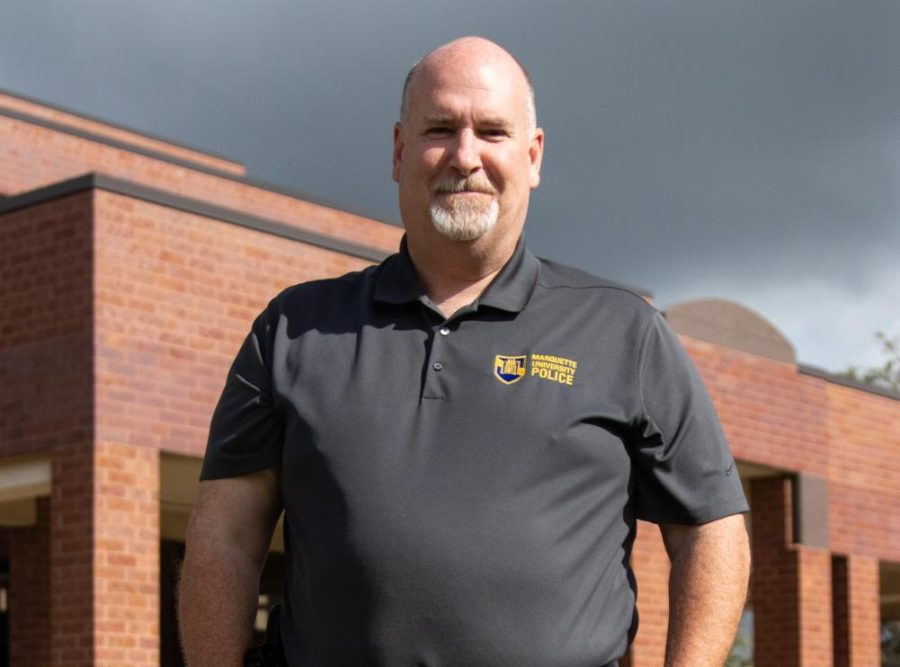For some students, college campuses have begun to transform from a place of learning and growing to an arena full of dangerous and risky situations.
Marquette University faces an additional challenge, however, as the campus is located within one of the largest cities inside the Midwest. Although students could be exposed to crime anywhere in the city, only the campus is within Marquette University Police Department’s jurisdiction.
Alyssa Hartman, a first-year in the College of Health Sciences, learned this through losing her belongings on a bus outside of campus.
“It was quite late at night and I was out with some friends and my lanyard that had my IDs and unfortunately my dorm keys on it did get stolen,” Hartman says.
Although this happened to Hartman, she says that when she is on campus, she feels extremely safe.
“I worked directly with MUPD to help me with the Milwaukee Police Department police report that I had to file. MUPD has been extremely helpful and they’re always willing to sit down and help you through a police report or come and get you if you don’t feel safe,” Hartman says.
Marquette’s Police Department has been a part of the university since 2015 with the campus previously being protected exclusively by security guards. However, the department has continued to grow since its implementation.
The President’s Task Force on Community Safety was created in 2020 to address safety and security on campus and in the community through lasting solutions for safety measures, communication, resources and partnerships.
There are 12 proposals from the task force. Some of those completed includes reimagining campus transportation, establishing a Behavioral Health Unit within the Marquette University Police Department and expanding safety alert text availability to parents.
One of the most recent and widespread initiatives the task force has implemented has been the creation of the new rideshare service EagleExpress. Although the application has faced criticism from students, Marquette is still collaborating with the developers in order to ensure more efficient rides for students.
“I think that the EagleExpresses are a great option if you’re on campus because they’re there for you at the times that it’s needed most when it’s dark outside,” Hartman says.
Comparing data for the six months prior to implementation of the task force with data six months after shows a 46% decrease in robberies and a 26% decrease in motor vehicle thefts.
Aleksandra Snowden, director of undergraduate studies and associate professor in the department of social and cultural sciences, researches crime patterns across Milwaukee neighborhoods.
Snowden examines how alcohol-selling establishments and other places that operate in neighborhoods can contribute to neighborhood crime rates.
“Primarily, I focus on alcohol-selling establishments because of the important role that alcohol has in crime, and reducing alcohol availability via carefully designed and implemented policy mechanisms may reduce crime in neighborhoods,” Snowden says.
From her research, Snowden says violent crime in 2022 is 15% lower than it was in 2015, and property crime is 28% lower than it was in 2015. Specifically, Snowden says there has been a decrease in crime in the near west side, where Marquette is located.
The Near West Side Partners is a nonprofit organization funded through the support of Advocate Aurora Health, Harley-Davidson, Marquette University, Molson Coors and Potawatomi Business Development Corporation.
In 2015, NWSP launched the Promoting Assets, Reducing Crime initiative. This initiative aims to address the needs of the community in four areas: safety, housing, commercial corridor development and neighborhood identity and branding.
Through efforts of the PARC team, Near West Side Community Prosecution Unit, City of Milwaukee and local residents and businesses, the 27th Street Tobacco Shop was declared a public nuisance and voluntarily closed.
“Decrease in violent and property crime in the Near West Side is much greater than the decline in crime for the rest of the city. As such, the neighborhood in which the university exists has lower crime relative to the city of Milwaukee,” Snowden says.
For some students, like Alanna Rupert, a junior in the College of Health Sciences, these changes have been palpable. As a desk receptionist, Rupert says she doesn’t feel like she is in any additional danger because nothing criminal tends to happen at the front desk.
“I feel like crime on campus has gone down recently. Last semester, I used to get a notification a day from MUPD. Now, it’s more like once a week,” Rupert says. “Being at Marquette, I don’t think there is anything that can really be done to totally eliminate crime on campus or reduce it to that point. The university is inside a big city, and you can’t really fault the city for having crime.”
Despite the decrease in crime, Hartman says students should continue to make safety a priority because there are always safety issues.
“Even if you think that you are being as safe as possible, you have to be extra aware because people that are the top of their field, smartest in their class, are still going to have problems with safety,” Hartman says. “It doesn’t matter, so it’s important to make sure that you are taking extra precautions and going in groups of people as much as possible.”
This story was written by Hannah Hernandez and Clara Lebrón. They can be reached at hannah.hernandez@marquette.edu and clara.lebron@marquette.edu.







